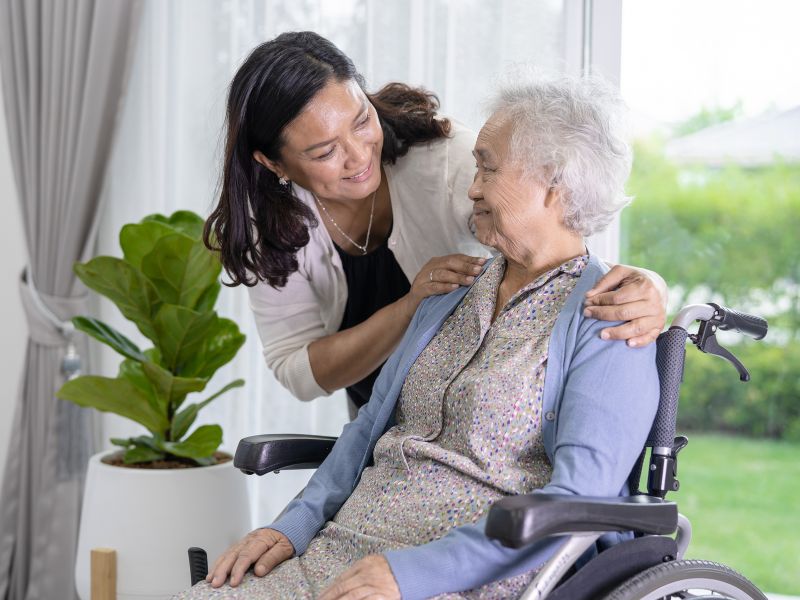Putting an elderly relative in a care facility is a life-changing choice for everyone. Your loved one‘s health may necessitate them to move, yet losing freedom is nonetheless difficult.
Care facility workers often replace family-led support, requiring residents and you to trust strangers.
No matter how essential, you must take steps to keep your senior safe in this unfamiliar environment. To keep them secure and you calm while you prepare their new home, follow these recommendations.
1. Establish And Review Care Plans Regularly
Meet with the care facility’s nurse lead and family liaison to discuss your loved one’s needs. Their doctor may have described their medical needs, but there’s typically more.
As someone close to them, your perspective helps provide personalized, empathic treatment. Discuss your senior’s dinner and sleep routine with the team to accommodate their new schedule.
Medical-grade furniture, fixtures, and equipment make care facilities less homey. Moving, receiving care from new people, and being away from home can be stressful.
To enhance the ambiance of your loved one’s new residence, adorn them with cherished photographs and other souvenirs from their house, to the extent that the available space permits.
Offer guidance and recommendations to assist your elderly relative in feeling comfortable, and request that comprehensive records be maintained, particularly in the initial stages, to assess their condition and psychological well-being. Regularly evaluate the quality of care by reviewing the care plan, medication regimen, and general engagement of the individual.
As the care requirements of your elderly family member change, it is important to document the updates to the plan and ensure that their records are updated accordingly. If the institution refuses to comply with this reasonable request, it could potentially indicate an underlying issue.
Take note of any indications of insufficient or hazardous treatment, documenting them with notes, photographs, and duplicates. Although it is probable that you will be capable of resolving any isolated concerns, this information may be beneficial in the event that you require the involvement of nursing home abuse attorneys in the conversation.
2. Visit Regularly — And Randomly
Create a timetable to ensure that you and other individuals connected to your loved one’s life make regular visits to them. It is advisable to verify the exact visiting hours, events, and mealtimes of care facilities that are most suitable for guests. Although you may have personal schedule limitations in addition to those of the facility, try to vary your schedule whenever possible. This will provide you with a diverse perspective on daily life, the care environment, personnel, and criteria.
Incorporate impromptu, unforeseen visits as well. This can offer a rejuvenating surprise for elderly individuals and guarantee a sense of reassurance over the consistent provision of high-quality care. If there are any unusual zero-visit hours, such as throughout the day, please request additional details. Although a restriction on late-night visits is justifiable, a prohibition on noon visits is a cause for concern.
If one encounters a loved one in an unsatisfactory condition during an off-cycle visit, it is imperative to promptly record the pertinent information. Implement appropriate measures to rectify the situation, such as addressing soiled bedding, addressing a missing bath, or addressing a prescription error. Consult the care liaison or state-designated advocate at the facility for guidance and recommendations on how to address the issue.
Ideally, your visits will be devoid of any significant events, allowing you to concentrate on enjoying each other’s company. Bring board games, photographs, or their preferred treat, as long as it aligns with their dietary plan. These minor actions have the potential to alleviate sentiments of alone, a prevalent experience among individuals residing in long-term care facilities. Express your affection for your beloved elderly individual by being present, attentive, and pleasantly surprising them with modest yet significant gestures.
3. Know The Warning Signs Of Abuse
The occurrence of abuse in nursing home settings is a terrible truth that is often avoided by individuals. The manifestation of abuse may not always be readily apparent, and the victim may exhibit reluctance in revealing the reality. It is important to get knowledge on the characteristics of one’s loved one and the facility itself. Observable deficiencies in charting, unsanitary beds, and inadequate personnel can either be isolated incidents or indicative of a more extensive issue.
It is advisable to promptly inquire about any observations, auditory stimuli, or perceived sources of concern. It is advisable to inquire with an older individual, employing a curious approach rather than an accusatory one. Due to their dependence on their care team, individuals may be reluctant to be open and honest due to concerns about exacerbating the maltreatment. Engage in a private conversation with your significant other to gain insight into the events that transpired. Direct your attention towards attentive listening, refraining from expressing your emotions at a later moment.
Examine for bruises, scratches, or indications of falls, as these are prominent indicators of abuse or neglect. Examine their living area as well, and verify the presence of fundamental hygiene, operational medical apparatus, and prescribed prescriptions. Failure to promptly repair aids like as canes, glasses, and walkers in a damaged condition also constitutes abuse.
Regrettably, verbal abuse is prevalent and exhibits even fewer overt indicators. Observe the reaction of your loved one in the presence of their care team. If individuals exhibit signs of dread, alter their behavior, or withdraw, it indicates the presence of an underlying issue.
Take note of the care providers who or what provokes this response, and when it occurs. Please utilize the above information to formally notify the facility, elder rights authorities, and/or a nursing home abuse attorney regarding the occurrence of abuse.
Be An Ever-Present Fixture In Your Loved One’s Care
Although the responsibility of caring for your older family member has been given to their nursing facility, it is essential for you to remain actively involved in order to ensure their well-being. Remain engaged in their life and maintain a focused gaze from their caregivers. The provision of support, care, and importance to senior individuals is crucial in mitigating feelings of loneliness.
The care facility staff will familiarize themselves with you and provide you with updates on your needs, modifications, and concerns. To ensure your loved one receives dignified care, it is important to actively participate in care planning, enhance your relationships with facility personnel, and be aware of the indicators of abuse.






